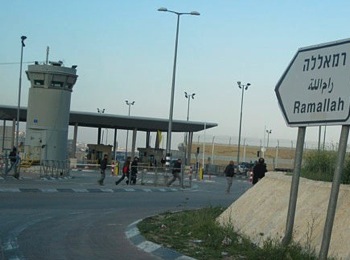Students Lose Time And Patience At Israeli Checkpoints
Comments (0)

Israel implements hundreds of checkpoints. Photo by Neon Tommy/Len Ly
"The main thing that controls our day is the mood of the 17-to-19-years-old soldiers on the checkpoint," says Tahboub, a law major at Birzeit University.
The 21-year-old student recalls one day in March, for example, when there were only five people in front of her at the Qalandia checkpoint. The wait was an hour and seven minutes exactly.
Tahboub says she considered that one of her better days.
Qalandia is the main checkpoint that connects Jerusalem to the city of Ramallah in the West Bank. It is among the hundreds of checkpoints Israel implements along its border and near Jewish settlement areas in Palestine. Israel calls the checkpoints a security measure against Palestinian terrorism; Palestinians and Israeli Arabs label them a mode for control. And students like Tahboub say, checkpoints are an impediment to their access to an education.
School has closed more than 15 times at Birzeit University in the West Bank because of Israeli security interruptions, says spokesperson Yasser Darwish.
Since the 1970s Birzeit lecturers, staff and students have been harassed, arrested and detained in Israeli prisons and detention centers, he says. As a result, the university offers legal assistance to its campus community and in 2002 started the Right to Education Campaign to continue that work.
A typical day means spending two hours at the Qalandia checkpoint while on the way to Birzeit University and another two hours at the checkpoint when returning home, Tahboub says.
Classes end at 5 p.m. for Tahboub. She hops into a taxi to reach Ramallah. From there she takes a bus. The bus then needs to pass the Qalandia checkpoint before entering Jerusalem where she lives. She never reaches home before 7:30 p.m.
During the procedure, the bus waits on the other side of the security gate while Tahboub walks to the checkpoint.
First, a soldier has to let people in.
"The soldiers who stay there usually you find them reading a book or listening to music, so we have to wait until they finish the chapter or the page they are reading so they would bother themselves to look who's waiting," Tahboub says.
Once inside the checkpoint, there are five terminals. Tahboub says usually one or two are open per day and can close abruptly, starting the wait process again. If the soldiers suspect anything, the individual would be sent to another room for a strip search.
"They sent me twice to that room and I refused to take anything off so they kept me there for three hours and then let me pass to Jerusalem," she says.
Tahboub rescheduled her classes one semester to avoid long waits at checkpoints, but the unpredictable cycle remains.
"I get home exhausted and I can't focus on my studies and the humiliation does not stop here," she says.
Lisa Goldman, a journalist and blogger in Israel, says the problem with checkpoints is that they are very arbitrary.
"There are no formal policies in place and it depends very much on the attitudes of the officers, how tightly he holds the soldiers back and what kinds of orders he gives them," Goldman says. "Many times you'll find soldiers just arbitrarily humiliating Palestinians at checkpoints for example. Other times you'll find soldiers going way out of their way to make things as easy as possible and feeling sort of embarrassed about being there."
Itai S., an Israeli soldier, says checkpoints are not meant to be punitive but have helped reduce terrorist attacks on Israelis.
"Look, there is a problem. Arabs--they start from a young age to hate Israel," the 18-year-old
says. "It's really for security. We don't have any reason really to make them late for class."
But students like Sawsan Abu Qare' say checkpoints are a human rights violation.
Birzeit University was a good college choice for Abu Qare' largely because she lives a 35-minute walk or eight-minute drive away in north Ramallah with her parents.
"In fact, I wanted to go to another university to study something else than English but my father didn't want me to go to a far place and cross checkpoints everyday," says the 21-year-old, an English literature major with minors in business administration and translation.
Abu Qare' lived in Beit Haneena, a village near Jerusalem, for 16 years. When she was in 5th grade, the Israelis closed the road that connects her side of town to the other side of town where her secondary school was located. What was originally a seven-minute drive or 25-minute walk to school became a 40-minute walk, then turned into a long bus drive combing different towns, and escalated into an hour-long journey using two taxis.
When Abu Qare' finished 10th grade, Israel built a new road and extended the separation wall. The wall goes through Beit Haneena and connects other settlements to Tel Aviv. This road permanently divides Beit Haneena.
"And if anyone tried to go over the wall [they] would be arrested because most of the times Israeli patrols are near," Abu Qare' says.
Eventually she moved to Ramallah where there are fewer checkpoint interruptions.
Emile Saba, like Tahboub and Abu Qare', says he has never been arrested at the checkpoints but has seen it happen to other students.
"Once they stopped the taxi I was in and ordered all the guys to go out," says Saba, 20, an English major. "Our IDs, pockets, bags were checked and a guy was arrested and the others including me went back to the taxi."
Under Israeli law, students can file a complaint, says Tamer Massalha, legal adviser at Mossawa Center, an advocacy center for Arab citizens in Israel. He says most complaints, however, are not submitted.
"The problem is that most police points are located in the settlements," Massalha says. "The students fear the settlements."
Reach reporter Len Ly here.



